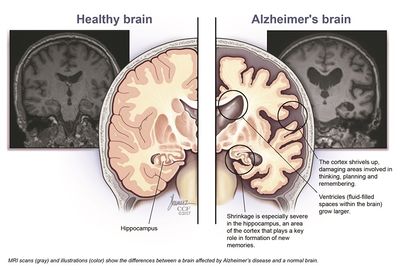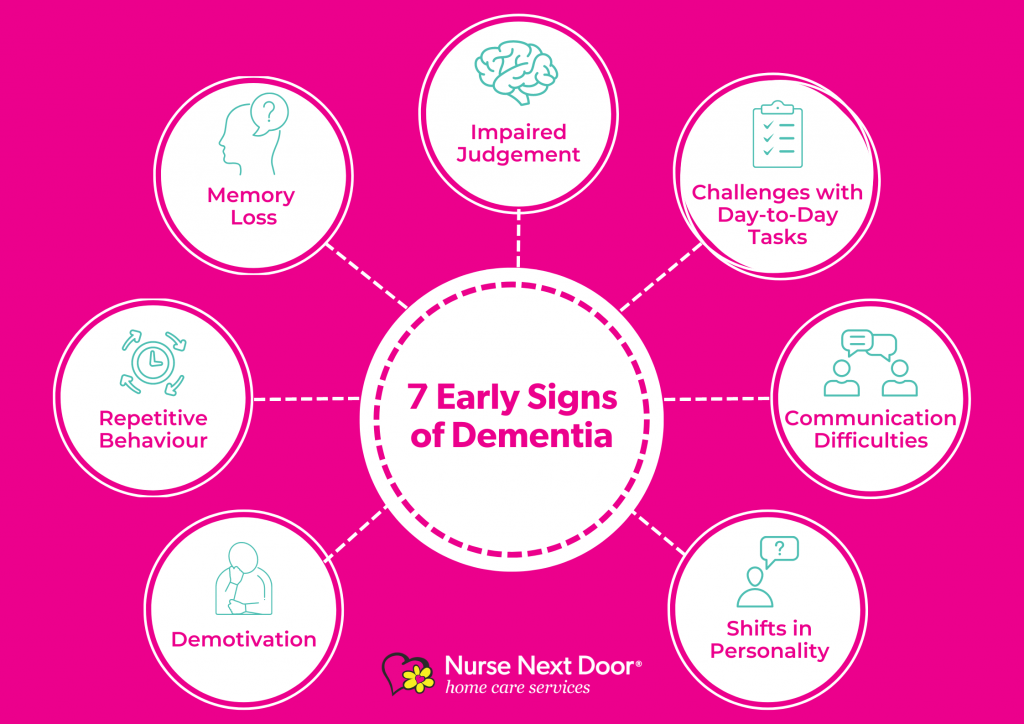Coping Strategies for Families Facing Frontotemporal Dementia
Coping Strategies for Families Facing Frontotemporal Dementia
Blog Article
Recognizing the Influence of Mental Deterioration on Life and Caregiving
Dementia affects daily life in profound means, impacting not simply those detected but likewise their caretakers. As cognitive decline advances, you could discover adjustments in communication and routine that obstacle both parties.
The Phases of Dementia and Their Results on Day-to-day Live
As you browse the journey of mental deterioration, understanding its stages can markedly affect how you take care of life. Mental deterioration normally progresses with three major stages: early, center, and late. In the onset, you might discover periodic memory lapses or trouble discovering the ideal words. This can lead to stress, but acknowledging these indicators early aids you adjust your regular and seek support.
Throughout the middle stage, you'll experience much more visible cognitive decline. Daily jobs could come to be difficult, and preserving your self-reliance may require adjustments. Utilizing reminders and simplifying your atmosphere can assist.
In the late phase, people often need considerable aid with everyday tasks. Planning for care becomes important, concentrating on convenience and lifestyle. By recognizing these stages, you're far better equipped to react proactively, ensuring you or your enjoyed one can browse the challenges with dignity and grace.

Changes in Interaction and Social Interaction
How do modifications in communication influence your daily communications as mental deterioration progresses? As dementia advancements, you might discover that easy discussions come to be tough. Words might escape you, or you may struggle to find the right phrases. This can lead to stress for both you and your enjoyed ones. Nonverbal signs, like motions or faces, come to be increasingly important.
You might find it much easier to attach via these methods rather than relying entirely on spoken language. Listening abilities can also alter; you might find it more challenging to remember or follow discussions what was simply stated (Vascular Dementia). This can cause misconceptions or feelings of seclusion
Encouraging perseverance and producing a supportive setting can assist. Participating in tasks that promote connection, like music or art, can enhance social communications. Remember, preserving relationships is still feasible; it's practically adjusting to new means of interacting.
Influence On Daily Routines and Activities
While steering everyday routines, you'll likely observe that tasks you once completed easily become extra difficult as dementia advances. Simple tasks like cooking, dressing, or even bathing might require more effort and time. You might find yourself failing to remember actions in acquainted regimens or struggling to recall where you placed products. This can cause disappointment not simply for you, yet additionally for those around you.
Adapting your setting can help; for instance, labeling things or using checklists can simplify tasks. Involving in recurring, organized tasks can likewise supply convenience and a feeling of achievement. Bear in mind, it's fine to ask for aid.
Behavior and emotional Challenges
Steering via day-to-day regimens can bring around not simply sensible obstacles, however behavioral and also psychological ones. You might discover changes in mood, such as increased stress and anxiety or aggravation, which can stem from complication or trouble in completing jobs. As you browse these moments, it is vital to identify that your enjoyed one may reveal their feelings via behaviors like agitation or withdrawal.
These psychological actions can be unpredictable and might develop without caution, leaving you both feeling overwhelmed. You may find that acquainted settings or routines can help lower anxiousness, yet maintaining persistence becomes significant. It is necessary to validate their feelings, also if you don't fully comprehend them.
The Role of Caregivers in Sustaining People With Dementia
As a caretaker, you play an important function in supplying psychological assistance for individuals with dementia. Establishing daily treatment regimens can produce a sense of security and comfort, helping to alleviate their anxiousness. By comprehending their demands and using effective approaches, you can considerably improve their high quality of life.
Emotional Support Techniques
When taking care of somebody with dementia, comprehending the emotional landscape is crucial for offering effective support. You'll frequently find that patience and compassion go a lengthy method. Verify their feelings; if they express confusion or disappointment, recognize it without dismissing their feelings. Straightforward motions, like holding their hand or maintaining eye get in touch with, can develop a complacency. Attempt to take part in tasks that they take pleasure in, as this can stimulate pleasure and connection. Remember to interact plainly and gradually, making use of a tranquil tone. Urge expression via songs or art, which can serve as an effective electrical outlet. Eventually, do not neglect to deal with your very own psychological needs; looking for support on your own can boost your capacity to look after them.
Daily Treatment Routines
Developing everyday care regimens is crucial for giving security and convenience to individuals with mental deterioration, as these routines can help reduce confusion and anxiousness. You can begin by describing a consistent timetable for meals, tasks, and rest. This predictability aids your loved one feel a lot more safe and engaged.
Incorporate familiar jobs, like folding washing or watering plants, which can stimulate favorable memories and cultivate a feeling of success. Usage visual cues, such as calendars or lists, to assist them through the day.
Be versatile, though; adapt routines as required based on their mood or energy levels. Frontotemporal Dementia. Keep in mind, your persistence and understanding are crucial in maneuvering their changing needs, ensuring they feel supported and valued throughout their day-to-day live
Creating a Safe and Comfy Living Atmosphere
Developing a safe and comfortable living setting is vital for people with dementia. You'll desire to make home safety and security adjustments that reduce threats and ensure knowledge to supply a feeling of comfort. By focusing on these facets, you can aid create an area that sustains both safety and security and well-being.
Home Safety And Security Alterations
As you browse the challenges of mental deterioration, making home security modifications can greatly boost convenience and safety and security. Tag essential areas, such as the shower room and kitchen area, with clear signs to aid with orientation. These adjustments not only advertise check here safety yet additionally motivate freedom, enabling your enjoyed one to feel even more at simplicity in their atmosphere.
Comfort and Experience
After guaranteeing a secure environment with needed modifications, fostering convenience and experience is essential for individuals with mental deterioration. Start by customizing their space. Use acquainted shades, decorations, and photos that stimulate pleased memories. A favored blanket or chair can provide a complacency. Preserve a consistent regular to aid them really feel based and lower stress and anxiety. Straightforward, acquainted meals can also develop a calming environment. Maintain pathways clear and clutter-free to avoid complication. Integrate soft illumination, as bright lights can be disorienting. Think about adding calming fragrances, like lavender, to promote relaxation. Participating in acquainted activities, such as paying attention to songs or gardening, can boost their feeling of belonging, making their living setting a real haven.
Methods for Efficient Caregiving and Support
While steering the difficulties of dementia treatment can really feel overwhelming, executing reliable methods can considerably improve both the caregiver's and the person's everyday experience. Start by developing a routine; predictability helps in reducing anxiousness for both you and your enjoyed one. Use clear, easy interaction-- straight concerns and short sentences can prevent complication.

Don't fail to remember to deal with on your own; schedule breaks and link with assistance teams. Sharing experiences with others in comparable circumstances can provide beneficial understandings and emotional alleviation.
Last but not least, remain individual and flexible. Mental deterioration can bring uncertain modifications, so adjusting your technique is essential. By employing these techniques, you can cultivate a much more favorable setting that benefits both you and your enjoyed one.
Often Asked Concerns

What Are the Various Types of Dementia?
You'll find several sorts of dementia, including Alzheimer's, vascular dementia, Lewy body mental deterioration, and frontotemporal mental deterioration. Each see this site kind impacts memory and cognitive function in a different way, so comprehending the distinctions is crucial for correct medical diagnosis and care.
How Can I Help Someone With Early-Stage Mental Deterioration?
You can aid a person with early-stage mental deterioration by holding your horses, supplying support, and urging them to participate in activities they take pleasure in. Maintaining routines consistent and preserving open communication can likewise make a considerable difference in their everyday life.
Are There Financial Resources Available for Dementia Treatment?
Yes, there are funds offered for dementia care. You can explore entitlement program programs, not-for-profit companies, and insurance options. It's also a good idea to speak with regional companies for certain resources customized to your circumstance.
What Lawful Factors To Consider Should Caregivers Know?
As a caretaker, you should consider power of attorney, healthcare proxies, and guardianship laws. It's vital to understand the lawful civil liberties and responsibilities you hold, ensuring your loved one gets proper care and defense.
Just How Can I Handle Caretaker Anxiety?
You can deal with caretaker stress by focusing on self-care, looking for support from groups or good friends, setting sensible expectations, taking breaks, and practicing leisure techniques. Bear in mind, your wellness matters equally as high as the individual you're taking care you could try here of.
Recognizing the Influence of Dementia on Daily Life and Caregiving.
As you browse the trip of mental deterioration, comprehending its phases can noticeably impact exactly how you manage everyday life.While navigating day-to-day routines, you'll likely observe that jobs you as soon as completed effortlessly become much more difficult as dementia proceeds.Developing daily care routines is necessary for offering stability and comfort to individuals with dementia, as these routines can assist minimize complication and anxiousness.While maneuvering the challenges of dementia care can feel overwhelming, carrying out reliable strategies can significantly enhance both the caretaker's and the person's day-to-day experience.
Report this page